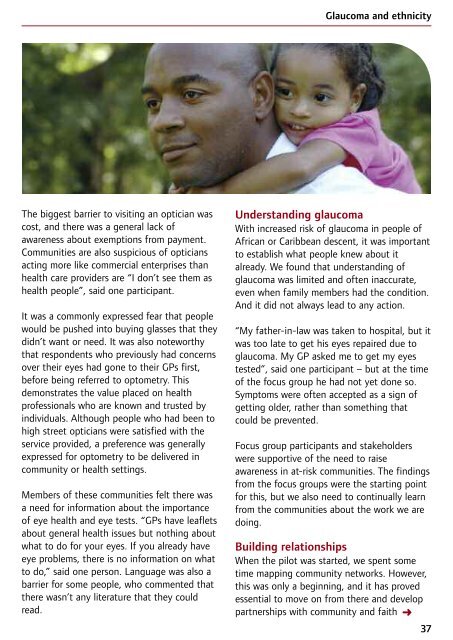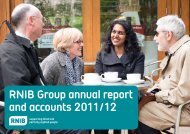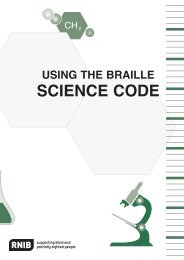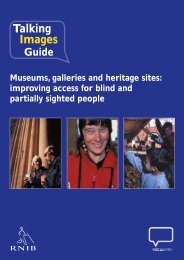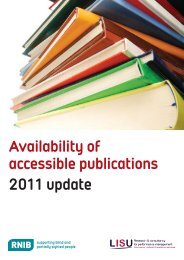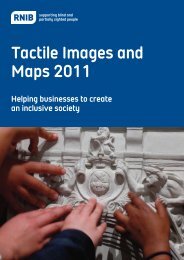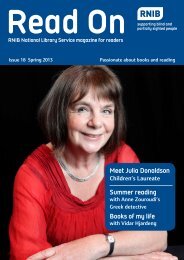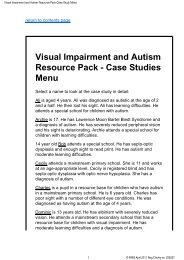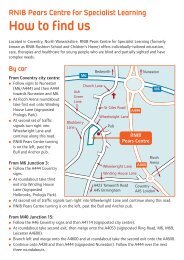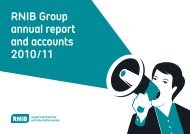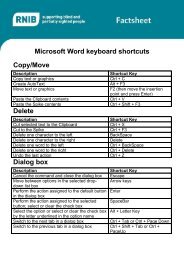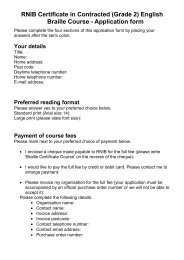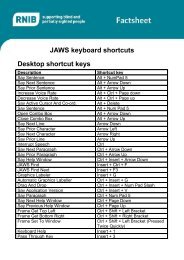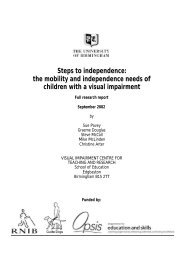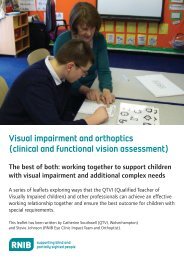Reflections on sight loss - RNIB
Reflections on sight loss - RNIB
Reflections on sight loss - RNIB
You also want an ePaper? Increase the reach of your titles
YUMPU automatically turns print PDFs into web optimized ePapers that Google loves.
Glaucoma and ethnicity<br />
The biggest barrier to visiting an optician was<br />
cost, and there was a general lack of<br />
awareness about exempti<strong>on</strong>s from payment.<br />
Communities are also suspicious of opticians<br />
acting more like commercial enterprises than<br />
health care providers are “I d<strong>on</strong>’t see them as<br />
health people”, said <strong>on</strong>e participant.<br />
It was a comm<strong>on</strong>ly expressed fear that people<br />
would be pushed into buying glasses that they<br />
didn’t want or need. It was also noteworthy<br />
that resp<strong>on</strong>dents who previously had c<strong>on</strong>cerns<br />
over their eyes had g<strong>on</strong>e to their GPs first,<br />
before being referred to optometry. This<br />
dem<strong>on</strong>strates the value placed <strong>on</strong> health<br />
professi<strong>on</strong>als who are known and trusted by<br />
individuals. Although people who had been to<br />
high street opticians were satisfied with the<br />
service provided, a preference was generally<br />
expressed for optometry to be delivered in<br />
community or health settings.<br />
Members of these communities felt there was<br />
a need for informati<strong>on</strong> about the importance<br />
of eye health and eye tests. “GPs have leaflets<br />
about general health issues but nothing about<br />
what to do for your eyes. If you already have<br />
eye problems, there is no informati<strong>on</strong> <strong>on</strong> what<br />
to do,” said <strong>on</strong>e pers<strong>on</strong>. Language was also a<br />
barrier for some people, who commented that<br />
there wasn’t any literature that they could<br />
read.<br />
Understanding glaucoma<br />
With increased risk of glaucoma in people of<br />
African or Caribbean descent, it was important<br />
to establish what people knew about it<br />
already. We found that understanding of<br />
glaucoma was limited and often inaccurate,<br />
even when family members had the c<strong>on</strong>diti<strong>on</strong>.<br />
And it did not always lead to any acti<strong>on</strong>.<br />
“My father-in-law was taken to hospital, but it<br />
was too late to get his eyes repaired due to<br />
glaucoma. My GP asked me to get my eyes<br />
tested”, said <strong>on</strong>e participant – but at the time<br />
of the focus group he had not yet d<strong>on</strong>e so.<br />
Symptoms were often accepted as a sign of<br />
getting older, rather than something that<br />
could be prevented.<br />
Focus group participants and stakeholders<br />
were supportive of the need to raise<br />
awareness in at-risk communities. The findings<br />
from the focus groups were the starting point<br />
for this, but we also need to c<strong>on</strong>tinually learn<br />
from the communities about the work we are<br />
doing.<br />
Building relati<strong>on</strong>ships<br />
When the pilot was started, we spent some<br />
time mapping community networks. However,<br />
this was <strong>on</strong>ly a beginning, and it has proved<br />
essential to move <strong>on</strong> from there and develop<br />
partnerships with community and faith ➜<br />
37


